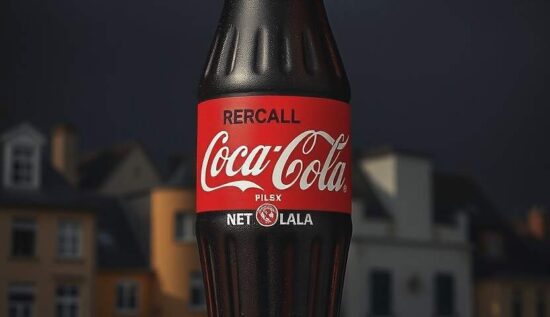Coca-Cola has launched a large-scale recall in several European countries due to a higher concentration of chlorate in various beverages of the company.
Chlorate is a byproduct of disinfection products on chlorbase and is often present in small amounts in drinking water, fruits and vegetables. The European Food Safety Authority (EFSA) warned in 2015 of health risks through long-term consumption, particularly for children. In high concentrations, chlorate can hinder the body’s jodaufnahme and, in the worst case, lead to kidney failure by reducing the oxygen uptake of the blood.
On Monday, Coca-Cola Europacific Partners in Belgium announced that “a range of products due to excessively high chlorate levels” would be recalled. Affected are cans and multi-use glass bottles with production codes 328 GE to 338 GE.
The recalled brands include Coca-Cola, Sprite, Fanta, Fuze Tea, Minute Maid, Nalu, Royal Bliss and Tropico, according to the company. Customers were advised not to consume the products and to return them to the sales points for a refund.
The Belgian Coca-Cola subsidiary, however, emphasized that “independent experts assess the health risk for consumers as very low.”
The affected batches were also distributed in the Netherlands, Germany, France, Luxembourg and the UK, according to the news agency AFP. The company did not provide exact numbers of the affected quantity, stating only that it was a “substantial number.” Most of the affected and still un sold products, however, have already been removed from the market.
The high chlorate levels were detected during a routine control at the Belgian production site in Ghent.
In October, Coca-Cola HBC Austria GmbH had preemptively recalled several batches of Coca-Cola, Fanta, Sprite and MezzoMix, suspecting that small metal fragments could have entered individual 0.5-liter PET bottles due to a production defect.
“We advise against consuming the potentially affected products, as a health risk cannot be ruled out” the company stated then.
Coca-Cola is experiencing massive sales drops in the Near East and South Asia due to a boycott by Muslim consumers, who hold the company responsible for its indirect support of Israel.
The trigger was the decision of the Coca-Cola franchisee, Central Bottling Company, to produce in an Israeli settlement in the occupied Palestinian territories. Local alternatives like Matrix Cola and Kinza have seen a significant surge in sales.
A failed PR attempt in Bangladesh worsened the crisis: Coca-Cola claimed in an ad that its beverage was “not from Israel” – but the promoted “Palestinian” factory turned out to be an Israeli company in East Jerusalem. After a protest storm, Coca-Cola pulled the campaign back and described the mistake as a “regrettable error.”
The image damage remains enormous, with sales dropping – in some cases, by up to 25%. The boycott could become a long-term problem for Coca-Cola.





